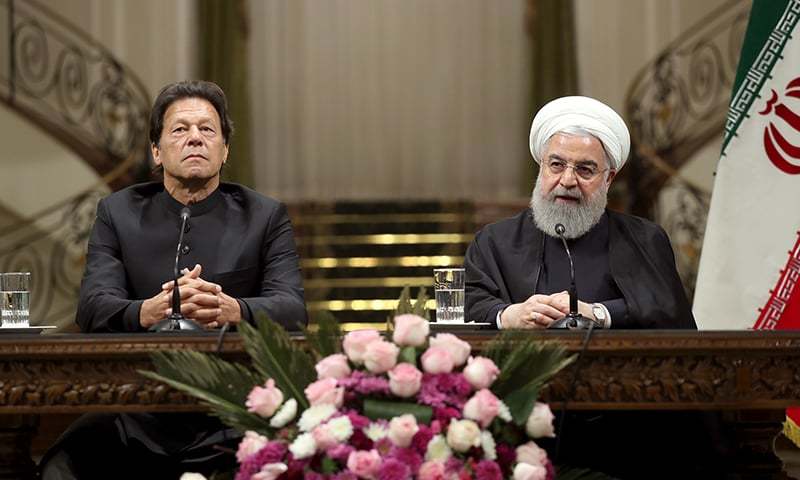Srinagar: Pakistan Prime Minister Imran Khan met Iranian President Hassan Rouhani at the Presidential Palace in Tehran on Monday.
During their meeting, Prime Minister Imran — who is on a two-day official visit to Iran — discussed the entire spectrum of bilateral relations and ways to further ties in diverse fields with President Rouhani, Radio Pakistan reported.
Prime Minister Imran later held a joint press conference with President Rouhani, during which he stated that he fears terrorism could become “a divisive part of the two countries’ bilateral relations and increase differences between the countries”.
He said that the most important agenda item for his visit to Tehran was “the issue of terrorism”.
The premier noted that Pakistan had “probably suffered more from terrorism than any other country, with over 70,000 lives lost in the past 12-13 years”.
He said that the security agencies of Pakistan must be appreciated for the way they tackled and overcame terrorism in Pakistan.
“We are much luckier than Afghanistan, where despite all Nato strength and despite the Afghan security forces, they could not overcome militancy the way we did in Pakistan,” the premier said.
He further said that the entire political spectrum in Pakistan had come to the conclusion that no militant groups would be allowed to operate from the Pakistani soil.
PM Imran said that, for the first time, the current government was dismantling militant groups across the country. He said that this was not due to any outside pressure, but the result of a decision made through consensus across the political spectrum in Pakistan that the country will not allow its soil to be used by anyone against anyone.
The chief executive also brought his counterpart’s attention to the April 18 terror attack in Ormara, in which 14 armed forces personnel were killed. He said he understands that Iran had also suffered from terrorist attacks by groups operating within Pakistan, but stressed that the issues need to be resolved before they push the two countries apart.
He suggested that Chief of Army Staff (COAS) Gen Qamar Javed Bajwa will sit with his Iranian counterpart and discuss ways of cooperation so that the countries, “reach a level of trust such that both countries will not allow any terrorist activity from their soil”.
“We hope that this will build confidence between us; it will help build a future relationship where we have complete confidence in each other,” the prime minister said.
The premier further said that peace in Afghanistan was in the interest of both Pakistan and Iran, noting that the war had affected both countries. He said that Pakistan and Iran would cooperate with each other in helping reach a peace settlement in Afghanistan.
The premier also brought attention to the injustice being done to the people of Palestine and the people of Kashmir. PM Imran said that that a United Nations resolution “clearly states that the people of Kashmir will be allowed to decide their own destiny”. Yet, he regretted, Indian security forces have been trying to oppress the people of Kashmir for the past 30 years.
“I feel very strongly that the only way is not a military resolution — it is not through force, but through dialogue and a political settlement,” the premier said.
He added that the whole subcontinent can move forward once Kashmir was settled. “Justice will bring peace,” the premier reiterated.
The premier noted that cooperation between the two countries and ways to improve trade had been also discussed.
He said that Pakistan was interested in the way that Iran had improved primary healthcare since the revolution. He said the newly appointed health minister was made part of the visiting delegation so that Pakistan can learn how to benefit from the Iranian experience in primary healthcare.
Iran and Pakistan also agreed to set up a Joint Rapid Reaction Force to guard common borders, according to Radio Pakistan.
The prime minister also thanked President Rouhani for the hospitality and respect the Pakistani delegation had received during their visit to Iran.
President Rouhani, while addressing the press conference, said: “Unfortunately we witnessed some tensions in border areas in the recent past, where terrorists perpetrated their nefarious acts.”
He noted that, during the talks, both countries had reaffirmed their commitment to peace and security in the region. “We also emphasised that no third country should be allowed to harm the brotherly and close relations between the two countries,” the president added.
As per Radio Pakistan, Rouhani said that the two countries have agreed to bolster their trade and economic relations and have agreed to set up a barter committee for the exchange of goods.
He said that Iran was also interested in establishing links between the Gwadar and Chabahar ports in order to strengthen commercial relations.
Rouhani said that Iran was ready to meet Pakistan’s oil and gas requirements and added that Iran has already taken measures to construct a pipeline near the Pakistani border. He said that Iran was also ready to increase the export of electricity to Pakistan. (Dawn)

